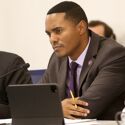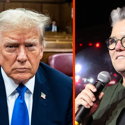
In case you haven’t heard, Logo and HRC are co-sponsoring the so-called “gay debate:” a forum during which leading Democratic presidential hopefuls discuss gay civil rights. We’re out here in Los Angeles and decided to have a sit down with Joe Solmonese, HRC’s esteemed leader.
We’ve given HRC and Joe some shit in the past, so this meeting between him and our editor may be just as historic as the forum itself. Okay, okay, it’s not that historic, but we’re happy to have had some face time with the non-prof honcho. We learned some surprising things about Joe and his perspectives. The most surprising? He reads – and likes! – Queerty. We nearly shat.
Find out what else Joe thinks, after the jump.
AB: So, here we are in Los Angeles
JS: Here we are.
How about we take this to the next level?
Our newsletter is like a refreshing cocktail (or mocktail) of LGBTQ+ entertainment and pop culture, served up with a side of eye-candy.
AB: How are you feeling about tonight?
JS: I’m feeling nervous. With the press – at least the gay press – the expectation is really high. You could talk to a hundred people and there are a hundred strong opinions of what should be asked and what should be answered. It’s only nervous making in that I feel like we want – at least on my part – to deliver what we can to the community and we can only take it so far. It’s really up to the candidates.
AB:What are some of the questions that people are asking? There are 4,000 or something…
JS: The first thing we did was divide them up into subject category…Don’t Ask, Don’t Tell, Marriage. What we really look for is, in the context of those questions, if somebody had a personal story to tell. If somebody asked, “What are you going to do about DADT…”
AB: It’s not as powerful.
JS: Margaret Carlson, the moderator, is in charge of the community questions. I took a lot of the HRC questions. I’ve been trying to figure it out – how do you frame a question to engage a conversation in the most meaningful way? So, I’ve looked back on what they’ve said before. I think if you walk them right up to it – “The Bible says this, but also says this” – if you give them too much, then there’s not really much else for them to do except pivot on what they’re comfortable with. It’s going to be really challenging. And then you want to challenge someone like Clinton or Obama or Edwards on marriage, but you don’t want to challenge Kucinich, because he’s for marriage. But you want to have a thoughtful conversation with him. “You’re president of the United States, what does that mean in the broader marriage stuff? What will you do?” You take all that stuff and you worry, “Who do I pose the question to?” You have to divide it up.
AB: What do you hope to accomplish tonight?
JS: I hope that we get to put a broader set of issues on the table. I hope we get to hear from these candidates that if they’re for something, what it is that motivates them to be for it personally or in their public service world. If they’re not for something, why not? Maybe if we getter a better sense of why [someone] is not for it, it would help us figure out how to get you to be for it. Ultimately, one of the most important things, is I look forward to is “What are you going to do?” You say you’re going to overturn DADT? How are you going to do that? You say that same sex couples should have the same federal benefits, what would three be? That’s a worthwhile question. Are these candidates thoughtful enough to come up with three?
AB: So you want to see how informed they are?
JS: I want to see how thoughtful they are.
AB: Thinking politically, there are two sides to the story. One is that the Republicans aren’t going to pull the gays out as a political weapon and therefore one can wonder “Are the debates necessary”. Also, I’m sure you saw the poll saying that in some swing states – Florida, Ohio and Pennsylvania – this could hurt the Democrats.
JS: I think you have to look at that with a bit of a measured eye. The thing about – there’s two things going on: first of all, on the issues front, there’s movement. There’s movement on gays in the military, movement on non-discrimination. If you get beyond the marriage issue – something like 30% of people knew someone who was gay in 1994 and it’s almost doubled. That’s completely tied to one’s view of gay rights. The other thing that I think is – people hate when I say this – the electorate has moved in terms of their overarching sentiment. In 2004, that was the first post-9/11 election, people were very fearful. I think the [GOP] did really well because if people are fearful for their kids, their economic situation, fearful of all this stuff you can’t identify, the notion of one thing Americans are really holdin on to, it’s their faith. People like Karl Rove, where he was really understanding that people are really holding on to that one thing, so [he] went into that one thing and tore at it. [He] did that by saying “gay people are going to come into your community and get married”. He needed the thing – that’s the mindset of the electorate. They needed the thing to drop into it. That worked. That divisive, anti-gay rhetoric in a fearful electorate. What we saw in 2006 was the electorate was angry. It’s really angry. So, when those same guys come forward and say “You’re worried about escalating gas prices, you’re worried about the war, it’s because the gay people want to get married.” That same electorate says “You’ve got to be fucking kidding me!” If they want to talk about the war in Iraq, we’re not a target. And that’s a good thing. These same anti-gay voters [of 2004], three years later, they think, “If someone’s trying to talk about gay marriage, they’re changing the subject.” When you talk about, “What’s the impact of showing up?” I think from a raw political calculation, these candidates understand that this is a safer terrain to play in, because they’ve seen after 2006, gay marriage was rejected.
AB: Do you think the candidates are all sincere about really care about gay people.
JS: Yes. I think they’re really sincere about caring about gay people. I think if you really got into some of the hearts and souls of some of these people and where they are on marriage… We all sit back and say, “They all support marriage.” I think it was David Mixer who had an op-ed piece that said something like, “They all support marriage, they just can’t figure out how to do it that would be viable”. I don’t think that’s true. I think that could be true for some of them, but if we zap them all with the truth serum, some of them may be, “I have many different audiences to answer to and I’m trying to get elected.” You might find people with that whole deeply held religious conviction about honoring the religious sacrament of marriage – I say, “We’re not talking about that. We’re talking about the civil institution of marriage,” but I think that you might find that in their souls.
AB: Like John Edwards.
JS: Like John Edwards, but still, he’s struggling. Is it enough? Is that enough for you? Are you curious to see what’s at the core of that struggle?
AB: I’d be curious to see what they have to say tonight when you’re asking them to elaborate on their positions. He’s the only one who has come forward and said, “This is how I really feel”.
JS: Where would you like to go next with that conversation?
AB: I would like him to try to learn more, but I’m not hearing such talk from the other candidates. They’re keeping it very legislative.
JS: What did you think about Richardson when he said, “Let’s have a conversation about what’s achievable?”
AB: I thought that was real. A lot of people go into the election season that all these things are going to change. Both of us know that’s not how the American government works.
JS: I think that you could get one of two things happening tonight. Who knows how much they preparing they do for this. Are Hillary and Barack going to [stay] very humane and right and open? Or are they going to say, “Look, how about a conversation about what we can do. What’s real?” Or are they going to say “We’re not going to make any news today”? I think it’s going to be curious to see what track they take.
AB: When someone like Hillary Clinton says, “As president, I will sign Employment Non-Discrimination into law,” it’s a bit misleading. If it gets passed, sure she will.
JS: Well, she supports and sponsors it.
AB: Right, but I think that kind of language is misleading to people who don’t understand how the American political system works. And she’s not the only one, of course. Moving on, I’m not sure if you saw an op-ed by Reverend Irene Monroe in which she writes that she’s worried HRC and Logo don’t represent people of color. She’s worried that –
JS: Does she think Jonathan Capehart represents people of color?
AB: I don’t remember what she said about him. She’s worried that [specific groups] won’t be represented, that institutionally, people aren’t represented.
JS: I did Sirius OutQ radio this morning and at the end of the interview, the guy said to me, “Everybody’s going to be really pissed at you tomorrow”. And it’s true.
AB: Well, there are two views: you can see a gay community or you can see gay communities? I think that’s the biggest split in gay politics right now – for gay people. Do you know how those issues can be resolved?
JS: I think that’s a whole different subject matter. With regard to Irene, there are probably a hundred op-eds today and I read them and know that some of those issues are going to get touched on and some are not. The unfortunate part is that since there’s no pleasing all of the people who are being very vocal, you just have to go with your gut and say “This is what I think we ought to do”. The biggest challenge for me in this job after two years is the incredibly disparate community. I talk to young African American trans kids in Baltimore, I talk to lesbians who work on the line at Ford Motor Company. Every week I go somewhere you’ve probably never been. I hear the degree of fear that people have for their safety, the degree of fear that people have for their jobs. I meet with HRC members or people who want to be HRC members or people in the blogosphere who have their own agenda based on their own lives. [The issues] vary between groups. What binds us is our genetic makeup, not our life experience. That’s the most difficult part of movement work: to get people inspired about the same agenda and move in the same direction. When you add diverse communities, it becomes more challenging. If we’re doing our jobs right, we’re working together where our interests intersect, but there needs to be more synergy. [Gay rights groups] haven’t done that well enough. The other subtly different way of looking at it is not just “Where do our interests intersect,” [there are] people who think we’re not enough of a service provider. We’re trying. If you tell us why your situation is different, we have an obligation to fix it. It’s not just where the work intersects, it’s that we’re not a service provider.


















Jack Jett
wow…he sounds kind of cool. maybe i have been wrong….no no…can’t be..ME? wrong? no
he does seem like an insightful and caring kind of guy…..but i can’t like him..cause he is the
establishment….
perhaps i’ll have a small side of crow tonight.
who did this interview?
jack jett
24play
Okay, I wanted to ask this as soon as I read Queerty would be reporting from the HRC/Logo Forum, but I restrained myself.
Now, after this blowjob for Solmonese, I have to ask:
Did HRC or Logo pay for Belonsky to fly out and cover the Forum?
And if one (or both) of them did, isn’t your favorable coverage pretty much bought and paid for?
allstarecho
Typical and usual double-talk from HRC.
David Hauslaib, Queerty
Nobody paid for Andrew to be in Los Angeles covering tonight’s forum. Well, by “nobody,” I mean: I paid.
None of our editorial is ever bought.
allstarecho
I predict not many will be able to watch it all the way through online because of servers that can’t handle the load. I predict this because Logo just isn’t in every cable market so we’re left with no other alternative than to watch it online.
24play
Thanks for the reply, David.
It’s good to know Queerty’s journalistic standards are higher than one might guess from reading Belonsky’s posts, which are always typo-ridden, frequently grossly insensitive and/or factually incorrect, and tend to display, at best, a tenuous understanding of some of the more serious subjects he attempts to cover.
Have you considered shifting some of Queerty’s travel budget to staffing so you could maybe afford an editor who wouldn’t be such an embarrassment?
nycstudman
“Every week I go somewhere you’ve probably never been.”
Nah, I’ve been to the Pines, to the West Side of Manhattan, to M Street, to West LA, to San Francisco.
thatguyfromboston
Hey! Lay off the Andrew! Sheesh, everyone’s a critic.
GranDiva
After some more direct conversation with Andrew, I (speaking as an individual) am a little more inclined to cut Andrew some slack. It’s not like he’s not trying…
I still don’t have the level of buy-in for Solomonese, either, though. It seems that HRC is still determined to posit itself as The Voice of Gay America (or at least share that title with GLAAD), when it just ain’t. Maybe I’m old-school delusional leftist, but it still seems like there’s something grossly assimilationist about the HRC agenda, and it really bugs. We are not them, because they will never see us as being just like them, and we’re wasting our time approaching things that way.
Leland Frances
Monroe, in her eagerness to play the race-card, didn’t acknowledge that Capehart will be there at all.
Still no explanation why an ostensibly straight woman, Margaret Carlson is sharing the stage with him for a forum on GAY issues, and his distinquishing between “community” and “HRC” issues only reinforces the idea that he and his fellow nobles think they are separate and above us somehow.
Which is further reinforced by the refusal to include older gay rights organizations in the forum. Joe must agree with Mel Brooks: “It’s good to be [the only] king.”
Finally, if he genuinely thinks “gay marriage” and the dreaded “gay agenda” won’t be issues in 2008 he is almost as dumb and dangerous as NGLTF’s Matt Foreman in this regard.
forbesfart
Rev.Irene Monroe made a valid point.I am pleased she brought it up. She too is a valued lgbt human voice. Last night I was surprised at Joe Solemese; perhaps I too have been too hard on him.
jackscribe
Good effort to bring LGBT dialogue with politicians on TV. Anyone notice that the LA Times does not list LOGO in its daily TV guide?
It would be interesting for Joe to explain the philosophy behind their cushy Washington offices and the large number of staff being paid over $150,000 per year.